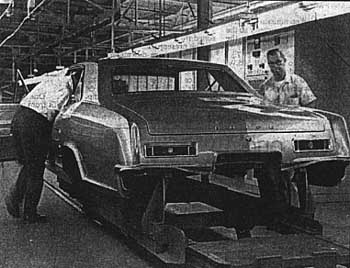|
Evolution
of the Riviera -
Concepts
and Design
by Ray Knott #1
Originally published in The Riview Vol. 18, No. 1 Nov. Dec.
2001
Interior designer George Moon was responsible for the inside, and making
do with parts from the other models, he did a credible job. The instrument
panel was adapted from the Electra series, to which Moon designed a functional
console that flowed from the dash down between the two front bucket seats.
The design was carried through to the back buckets as well. The interior was
done tastefully in chrome, satin and black crinkle finished in the days before
Federal regulations forced practically everything shiny off the interior of
the car.
 |
| The bodies were built in the Fisher Body Plant in Cleveland |
The car was then turned over to Phil Bowser, Buick's Director of Research
and Development, and his staff to develop a performance car with superior
handling. Mitchell even sent over an assistant with orders that the car should
have performance somewhere between a comfortable sedan and a sports car. They
decided on a modified cruciform frame, much like the one used on the Electra,
with higher torsional stiffness and suspension tailored for higher speed cornering.
To add to the handling, a new tire was designed especially for the Riviera,
with a rounded shoulder and wider tread, giving extra side bite to cope with
higher cornering speeds and higher lateral forces. Buick's largest engine,
the 401 ci, was selected, and to further increase power, the bore size was
increased by 1/8" to produce the 425 ci engine offered as an option.
In order to meet the design created by Mitchell and Nickles, Bowser had
to go to the engineers at Fisher Body. The design called for frameless glass
in the doors, which would require the glass to be positioned accurately against
the seals to prevent leaks and wind noise. Fisher proposed an entirely new
approach to door design - a door assembly with a detachable outer panel that
bolted on. This would allow the door to be hung and windows adjusted before
the outer panels were attached. Since the body was built by Fisher Body in
the Cleveland plant and assembled in Flint, this necessitated special fixtures
and gauges to align the fenders to the doors. But, as usual, Mitchell got
his way.
|
|
|
Original Logo sketches by Jack Tinker
|
The enthusiasm exhibited during the competitive presentation continued into
the marketing strategy. Roland Withers, the division's head of marketing,
wanted the car to have a special image. Accordingly, he decreed that no more
than 40,000 be built a year, which would make the car somewhat rare. They
also brought Jack Tinker back from retirement to head up the advertising campaign.
Tinker's team developed a transected "R" design and insisted that the early
ads show an "R" with a reflection. This stylized "R" was so popular it replaced
the use of the Buick Tri-Shield on the Riviera in 1964 and continues to -
be the symbol of the Riviera to this day. The elegance of these ads was classic
in design. Well into the ad campaign, Buick's marketing people felt the ads
were a bit too elegant, making the car too plush and un-affordable. As a result,
the ads were later toned down and optional leathers were not available in
the 1964 - '65 models.
Although Bill Mitchell often receives all of the credit for the Riviera,
as you see, it was a team effort. There is no doubt that we can credit Mitchell
for being the force that took the car from Ned Nickles' drawing board to the
showrooms. We have Ford Motors to thank as well, for if it were not for the
success of the Thunderbird, the management at GM may never have found the
need for a personal luxury car. (to be continued)
Sources:
Buick the complete history, by Terry Dunham and Lawrence Gustin
Buick 1946-1978 by Jan P. Norbye and Jim Dunne
Collectible Automobile, May 1985 by James W. Howell and Dick Nesbitt
Automobile Quarterly vol. 19 #2, by Jeffrey Godshall
Special Interest Auto, Dec. 1987, by Thomas E. Bonsall
Special Interest Auto, Mar. 1976, by Michael Lamm
Taped interview with Bill Mitchell
|



